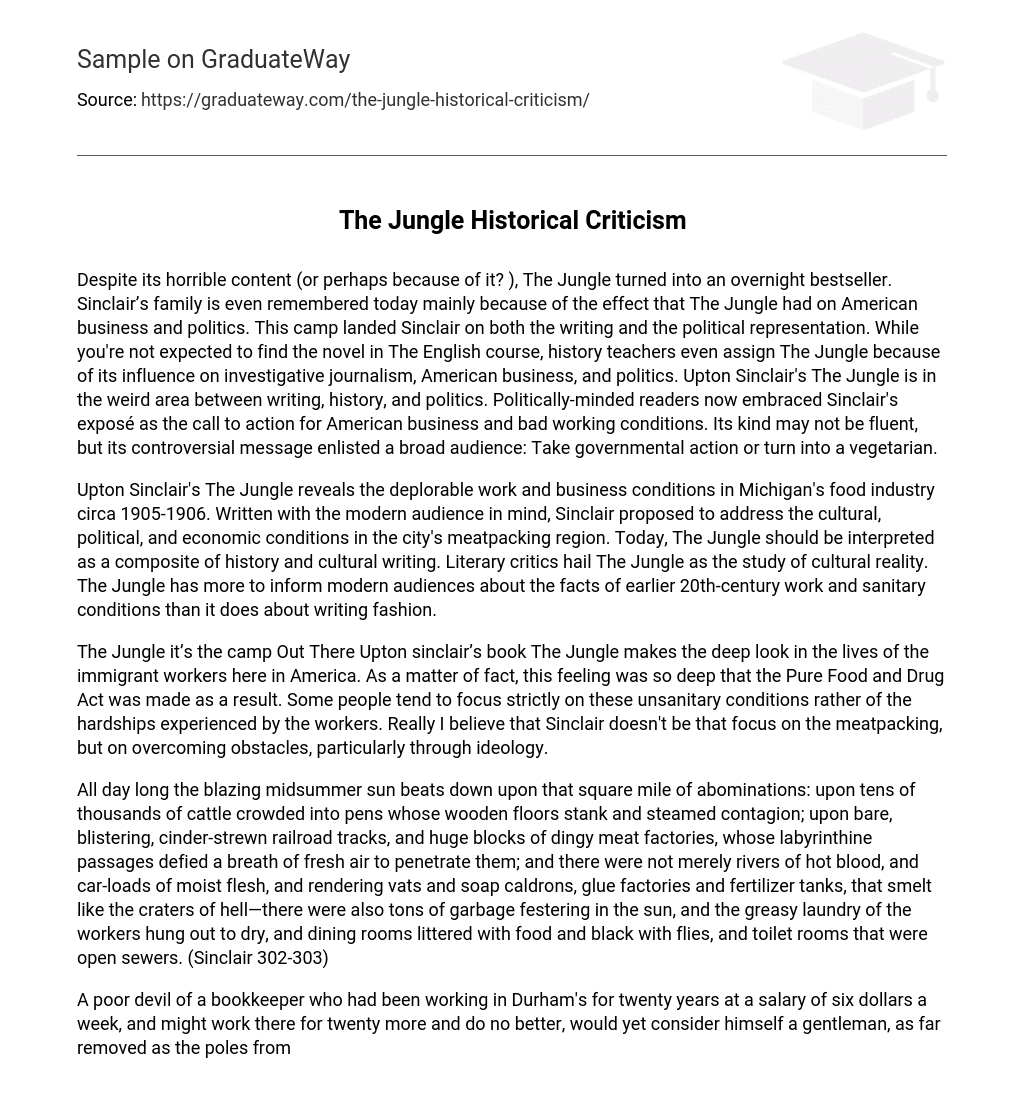Despite its horrible content (or perhaps because of it? ), The Jungle turned into an overnight bestseller. Sinclair’s family is even remembered today mainly because of the effect that The Jungle had on American business and politics. This camp landed Sinclair on both the writing and the political representation. While you’re not expected to find the novel in The English course, history teachers even assign The Jungle because of its influence on investigative journalism, American business, and politics. Upton Sinclair’s The Jungle is in the weird area between writing, history, and politics. Politically-minded readers now embraced Sinclair’s exposé as the call to action for American business and bad working conditions. Its kind may not be fluent, but its controversial message enlisted a broad audience: Take governmental action or turn into a vegetarian.
Upton Sinclair’s The Jungle reveals the deplorable work and business conditions in Michigan’s food industry circa 1905-1906. Written with the modern audience in mind, Sinclair proposed to address the cultural, political, and economic conditions in the city’s meatpacking region. Today, The Jungle should be interpreted as a composite of history and cultural writing. Literary critics hail The Jungle as the study of cultural reality. The Jungle has more to inform modern audiences about the facts of earlier 20th-century work and sanitary conditions than it does about writing fashion.
The Jungle it’s the camp Out There Upton sinclair’s book The Jungle makes the deep look in the lives of the immigrant workers here in America. As a matter of fact, this feeling was so deep that the Pure Food and Drug Act was made as a result. Some people tend to focus strictly on these unsanitary conditions rather of the hardships experienced by the workers. Really I believe that Sinclair doesn’t be that focus on the meatpacking, but on overcoming obstacles, particularly through ideology.
All day long the blazing midsummer sun beats down upon that square mile of abominations: upon tens of thousands of cattle crowded into pens whose wooden floors stank and steamed contagion; upon bare, blistering, cinder-strewn railroad tracks, and huge blocks of dingy meat factories, whose labyrinthine passages defied a breath of fresh air to penetrate them; and there were not merely rivers of hot blood, and car-loads of moist flesh, and rendering vats and soap caldrons, glue factories and fertilizer tanks, that smelt like the craters of hell—there were also tons of garbage festering in the sun, and the greasy laundry of the workers hung out to dry, and dining rooms littered with food and black with flies, and toilet rooms that were open sewers. (Sinclair 302-303)
A poor devil of a bookkeeper who had been working in Durham’s for twenty years at a salary of six dollars a week, and might work there for twenty more and do no better, would yet consider himself a gentleman, as far removed as the poles from the most skilled worker on the killing beds; he would dress differently, and live in another part of the town, and come to work at a different hour of the day, and in every way make sure that he never rubbed elbows with a laboring man. Perhaps this was due to the repulsiveness of the work; at any rate, the people who worked with their hands were a class apart, and were made to feel it. Sinclair 112)
The Jungle is the classic historical fiction by Upton Sinclair. First published in 1906, this book, originally released in serial manner, explores the ugly circumstances suffered by immigrants running in the meatpacking industry in industrial cities. Modern audiences were outraged by these unsanitary practices, and this novel finally led to the Federal Food Inspection Act of 1906. Sinclair’s purpose was to expose crimes against the working classes and trigger the growth in ideology. The Jungle was his debut book, and he spent some weeks running undercover at the meatpacking complex to make it. He subsequently wrote over a hundred books.
Except for that one walk when he left jail, when he was too much worried to notice anything, and for a few times that he had rested in the city parks in the winter time when he was out of work, he had literally never seen a tree! And now he felt like a bird lifted up and borne away upon a gale; he stopped and stared at each new sight of wonder—at a herd of cows, and a meadow full of daisies, at hedgerows set thick with June roses, at little birds singing in the trees. (Sinclair 235)





